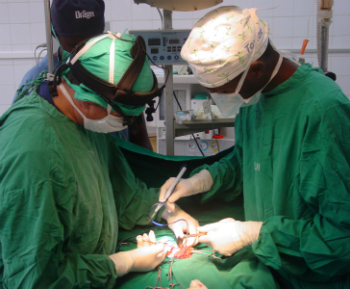Dr. Sherif Emil's dispatches from Rwanda: Thanksgiving

The last dispatch
I ended my surgical work in Kigali the same way I started it, trying to save yet another baby who had all the odds stacked against him. On Wednesday evening, with 48 hours left in my mission, I received a call from an American surgeon working in Rwanda’s other university hospital in Butare, 2 hours away from Kigali. He had a baby with a bowel obstruction who was now 2 weeks old, and he heard from colleagues that there was a visiting McGill pediatric surgeon in Kigali. Would I travel to Butare to operate on this baby? Unfortunately, it was not possible, since I had six planned operations for Thursday and Friday. I asked him to transfer the baby to us.
When I get a call from Northern Quebec regarding a patient with a surgical problem, I simply request that the physician transfer the child, and it happens. In Rwanda, transferring a baby from one hospital to another means having to jump several social, logistical, and financial hurdles. Rudolph, the Butare surgeon, was willing to jump all these, and I helped from my end to facilitate the transfer. The baby arrived at our hospital in the mid afternoon on Thursday. Not surprisingly, we once again found an emaciated and unstable baby who had not fed for two weeks, but miraculously survived. Significant resuscitation and preparation was needed to allow him to undergo surgery.
We got this done. I came to the hospital at 7:00 a.m. on Friday, my last day in Kigali, expecting to operate on the baby at 8:00 a.m. before the first scheduled case. To my surprise, the entire operating room was on hold. The hospital had no water supply since the previous night, preventing the sterilization of instruments. We were told that the operating room would be able to resume a regular schedule around 10:00 a.m. when instrument sterilization was complete. I completed rounds, visiting many of the patients I operated on during my stay one last time, and leaving clear recommendations for continued post-operative care. But 10:00 a.m., 11:00 a.m., 12:00p.m. and 1:00 p.m. came and went, and there was still no water. I had to leave by 4:00 p.m. to catch my plane. I just could not accept the irony that a child would be transferred specifically to undergo an operation by the only pediatric surgeon present in Rwanda on that day, and then miss the opportunity due to water shortage.
Finally, one set of instruments arrived after sterilization at another facility and we started the operation at 2:00 p.m. It went well. We were able to repair the obstruction, and introduce a feeding tube that would allow the child to receive calories for the first time the following day. I pray he makes it.
As I sit now in the airport in Brussels waiting to board my plane to Montreal, I think of this baby, the other 19 children I operated on over the last two weeks, and the dozens more I saw during my stay. I think of the ones who perished when they should have survived and the ones who survived despite all the challenges, including two babies similar to my last patient. I wonder who else has come into the hospital in the last few hours since I left Kigali, and how they will do. As I look at the people around me, I can just imagine how remote these conditions must feel to them, how much they take adequate healthcare for their children and themselves for granted. Rwanda is just a few hours behind me, but it already feels a galaxy away.
And then I think of my daughter, and the anxiety my wife and I live when she experiences relatively simple medical problems. And I remember how fortunate we are.
When I return to Montreal, I will let my experience of the last two weeks settle for a while. Then I will reflect more on my mission to Rwanda, a personal debriefing of sorts. But as I sit here across the Atlantic from my family, I resolve to accomplish two very important tasks when I return. First, I will give my wife and daughter the biggest and tightest hug I’ve ever given them. Second, we will all kneel down on our knees and thank the Lord for what we have.
Dr. Sherif Emil is a pediatric surgeon and Director of Pediatric Surgery at the Montreal Children's Hospital. His trip to Rwanda is part of a McGill program to train surgical residents at the National University of Rwanda and the Centre Hospitalier Universitaire Kigali.
Read more dispatches:
- Dispatch #1: From the African skies
- Dispatch #2: Edmond
- Dispatch #3: An African solution to an African problem
- Dispatch #4: The first (not so) easy case
- Dispatch #5: When good people do nothing
- Dispatch #6: Winning battles but losing the war
- Dispatch #7: The human factor is Rwanda’s best hope


